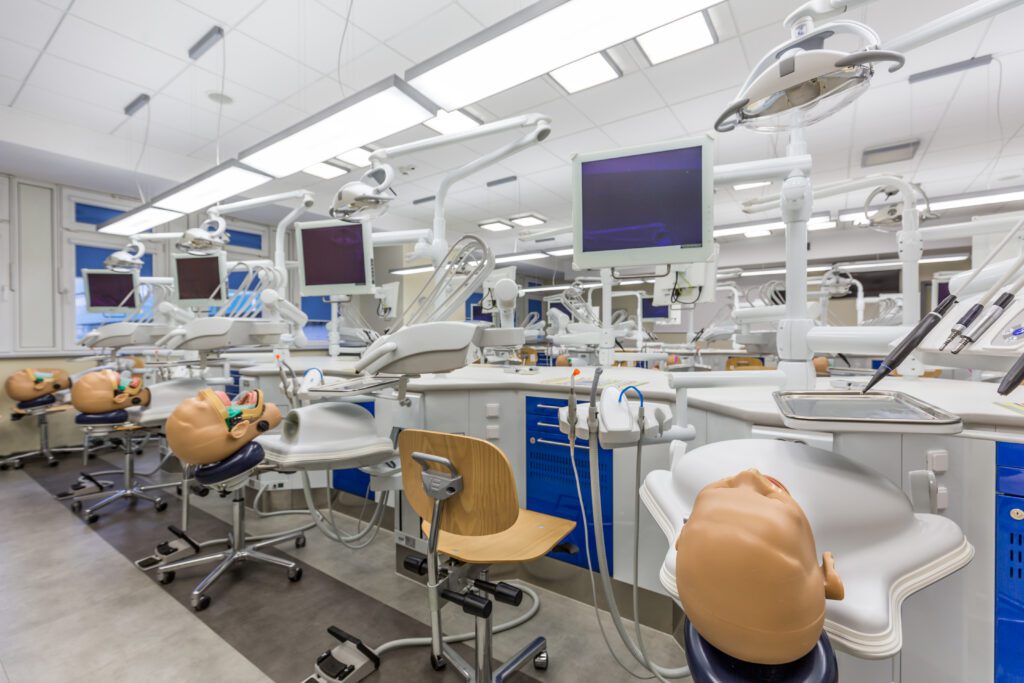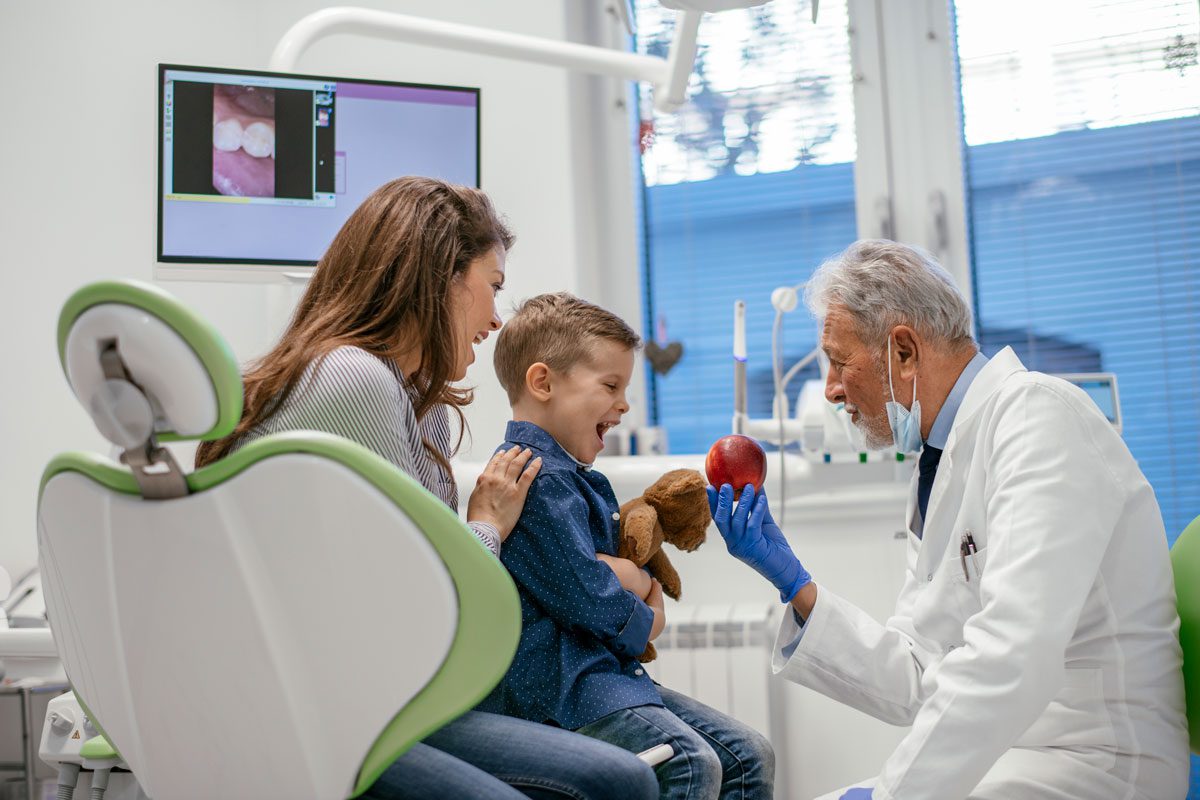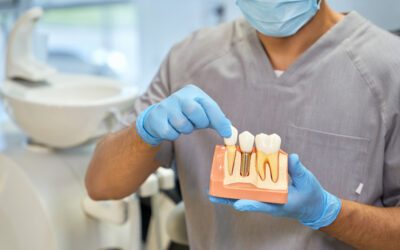What Is a Pediatric Dentist?
A pediatric dentist, also called a pedodontist, specializes in children's oral health care. These dental experts focus on the unique dental issues and concerns that can arise throughout the various stages of a child's life, starting with the emergence of baby teeth and extending through their teenage years.
Pediatric dentists undergo extensive training, which includes completing dental school and, after that, an additional two to three years of specialized education focused on treating children with gentle care and addressing the specific requirements of children and adolescents with special needs and disabilities.
Typically, children begin to get their baby teeth within the first 6 months of life. As they grow, pediatric dentists help monitor and maintain their oral health, addressing potential problems and ensuring that teeth and gums develop properly. This care may include checking for cavities, managing oral habits such as thumb-sucking, and discussing the importance of proper oral hygiene and nutrition with the child and their parents.
By offering tailored dental care, pediatric dentists aim to create a positive experience for children, helping to establish a foundation for a lifetime of healthy oral habits. This specialized care is designed to be both effective and enjoyable for young patients, with treatments and techniques specifically developed to address the unique needs of developing teeth, gums, and jaws.

Education and Training
To become a pediatric dentist, specific education and training are required in addition to general dentistry.
Dental School
The first step towards becoming a pediatric dentist involves completing an undergraduate degree. While a Bachelor of Science in dental hygiene is typical, other degree options are also acceptable when applying to dental schools.
After completing the undergraduate degree, aspiring pediatric dentists must attend dental school for four years. During dental school, students gain knowledge and skills in various dental disciplines, including diagnostics, treatments, oral health care, and preventive care. Upon successful completion of their dental education, they achieve a Doctor of Dental Surgery (DDS) or Doctor of Dental Medicine (DMD) degree.
Pediatric Dentistry Residency
After finishing dental school, aspiring pediatric dentists must enroll in a pediatric dentistry residency program. This specialized training, typically lasting two to three years, focuses on the unique dental issues related to infants, children, and teenagers. The curriculum accentuates pediatric medicine and dentistry, behavioral and pharmaceutical management of children, oral biology for the pediatric dentist, and general anesthesia.
During the residency, pediatric dentists gain experience in both hospital and community settings, learning to work as contributing members of the healthcare team. Upon completing the residency, pediatric dentists are well-prepared to provide comprehensive oral health care for young patients in various settings, from private practices to hospitals.
What is a Pediatric Dentist's Role?
A pediatric dentist is like a superhero for kids' teeth. They help little ones learn how to care for their teeth and avoid cavities. They are also trained for gentler care of their younger patients and managing those with special needs and disabilities.
Preventive Care
The primary focus of a pediatric dentist is to provide preventive care to ensure the healthy development of a child's teeth and gums. This involves regular check-ups, cleanings, fluoride treatments, and dental sealants to help safeguard against cavities and other dental issues. In addition, pediatric dentists guide parents and children on proper oral hygiene techniques to maintain good oral health at home.
Diagnosis and Treatment
Pediatric dentists are experts in identifying and addressing dental problems in children of all ages. They provide treatments for common issues such as tooth decay, gum disease, and dental injuries, as well as more complex cases, such as congenital dental disorders and orthodontic concerns. Children's dental needs often differ from adults, and a pediatric dentist has the necessary expertise to tailor treatments appropriately.
Moreover, they play a crucial role in detecting early signs of dental and oral health issues. Timely diagnosis and intervention can significantly impact a child's long-term dental health, preventing complications and facilitating proper growth and development of their teeth and jaws.

Behavior Management
One of the essential aspects of pediatric dentistry is addressing the anxiety and fear many children experience during dental visits. A pediatric dentist employs various behavior management techniques to create a relaxed and welcoming environment for young patients. This can include methods such as relaxation techniques, positive reinforcement, and the use of audio-visual distractions during treatments.
By effectively managing children's behavior and ensuring a positive experience during dental visits, pediatric dentists foster an atmosphere of trust and cooperation that helps establish a solid footing for a lifetime of consistent dental care.
Benefits of Choosing a Pediatric Dentist
Choosing a pediatric dentist is a game-changer for a kid's oral health journey. With a pediatric dentist, your child will feel more at ease, and you can rest assured knowing they're in the hands of someone who's trained to keep those little smiles shining bright.
Specialized Care for Children
Pediatric dentists, unlike general dentists, have undergone additional years of training specifically focusing on children's oral health. This specialized education allows them to provide comprehensive oral health care tailored to growing children and teenagers' unique needs. Their services include oral health exams, teeth cleaning, and fluoride treatments.
Moreover, pediatric dentists are skilled in handling a variety of dental concerns that are particular to children, such as preventive dental care, habit counseling for pacifier use and thumb sucking, and nutrition and diet recommendations.
Child-Friendly Environment
Apart from their expertise in dealing with children's oral health issues, pediatric dentists typically create a child-friendly environment in their clinics. The waiting areas and treatment rooms are designed to be welcoming and comfortable for children, easing their anxiety and helping them feel more relaxed during dental visits.
Furthermore, pediatric dentists are trained to use age-appropriate language and explanations when communicating with children, making it easier for them to understand and cooperate during dental procedures. This child-centered approach contributes to positive dental experiences and fosters a long-lasting relationship with oral hygiene from a young age.
Common Pediatric Dental Issues
Pediatric dentists, also known as pedodontists, specialize in diagnosing and treating dental problems in infants, children, and teenagers. In this section, we will discuss common pediatric dental issues, focusing on tooth decay, orthodontic concerns, and dental injuries.
Tooth Decay
Tooth decay, commonly known as cavities, is the most regular chronic disease affecting children in the United States. Cavities can cause pain and infections, which may lead to difficulties in eating, speaking, playing, and learning. Children with poor oral health tend to miss nearly three times more school and thus receive lower grades than those with good oral health. Pediatric dentists mostly fix cavities by filling them. Occasionally, the pediatric dentist may need to remove the tooth if the decay is severe.
Orthodontic Concerns
Orthodontic concerns are also common in children, as their jaws and teeth continuously develop and change. Some common orthodontic issues include:
-
- Crooked teeth
- Overbites
- Underbites
- Spacing issues between teeth
Pediatric dentists can identify and address these orthodontic concerns in children, often working closely with orthodontists to create a customized treatment plan to ensure proper dental alignment.
Dental Injuries
Children are very active and tend to play a lot, so they may encounter dental emergencies resulting from falls, accidents, and sports injuries. Some examples of dental injuries include:
-
- Tooth fractures
- Dislodged teeth
- A chipped tooth
- Soft tissue injury of the gums or tongue
Pediatric dentists are equipped to handle these dental emergencies and can provide appropriate treatment to minimize complications and ensure the long-term health of the child's teeth.
When to Visit a Pediatric Dentist
Understanding the appropriate time to schedule your child's first dental visit is crucial. In accordance with the American Academy of Pediatric Dentistry (AAPD) American Academy of Pediatrics (AAP) parents should organize their child's first dental appointment within 6 months of the first tooth's appearance or before their first birthday, whichever comes first.
Maintaining regular dental check-ups for children is essential for establishing good oral hygiene habits at a young age. It also helps in monitoring the growth and development of their teeth and jaw structure. Regular dental visits should be scheduled every 6 months or as the pediatric dentist recommends. These routine appointments will enable the dentist to detect and prevent potential oral health problems in the early stages.
During the first visit, the dentist will typically spend between 30 and 45 minutes with the child, assessing their oral health, providing guidance on proper dental care, and addressing any concerns the parents may have. Creating a positive relationship with a pediatric dentist early on can help children feel more comfortable during future appointments and reduce dental anxiety.
What is a Pediatric Dentist Summary
In conclusion, a pediatric dentist is a dental professional specializing in children's oral health, right from infancy to adolescence. They have extensive training and experience in dealing with the unique dental issues that arise during childhood source.
These dentists not only provide routine dental care for children but are also equipped to handle difficult behavioral situations that may arise during dental visits. They aim to create a positive and supportive environment, making children feel at ease while receiving dental treatment.
Pediatric dentists consider various factors to provide appropriate dental care, such as a child's development stage, oral anatomy, hygiene practices, eating habits, and overall health. Regular visits to a pediatric dentist are essential for maintaining a child's oral health and ensuring proper care for their teeth, gums, and mouth.
By choosing a pediatric dentist, you're not only investing in your child's dental well-being but also setting them up for a lifetime of bright, confident smiles. Their role goes beyond fixing teeth; they are essential partners in nurturing your child's overall health and well-being.




